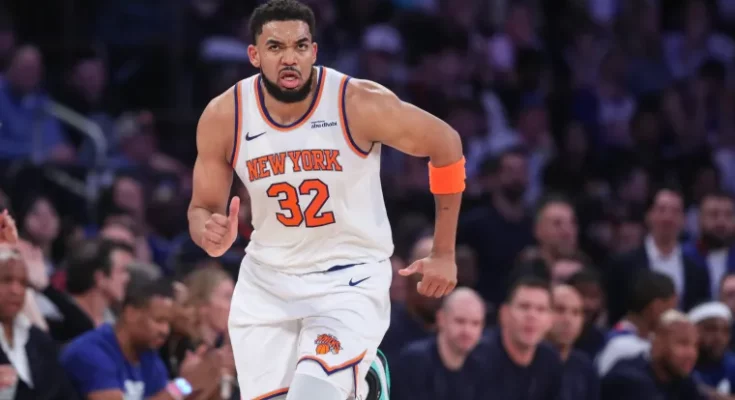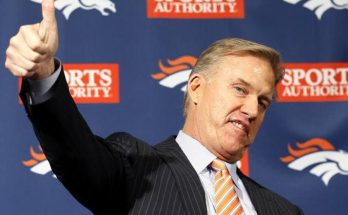The New York Knicks have long been one of the most scrutinized franchises in the NBA, and their latest move to acquire Karl-Anthony Towns has sparked yet another wave of controversy. While some fans initially celebrated the addition of the talented big man, analysts and critics have largely panned the deal, giving the Knicks unfavorable grades and questioning whether this trade truly improves the team’s long-term outlook. The acquisition of Towns, who has been an All-Star and one of the league’s most versatile scoring big men, might look good on paper, but the details of the trade have left many observers wondering if New York sacrificed too much for a player whose fit and durability remain in doubt. This trade has amplified the ongoing debate about the Knicks’ front office strategy, their willingness to mortgage future assets for a win-now push, and whether Towns’ skill set will actually elevate the franchise to true contention.
Karl-Anthony Towns is undeniably a high-level talent, known for his ability to stretch the floor, score from all three levels, and rebound effectively. However, his career has been marked by inconsistency and questions about his ability to lead a team deep into the playoffs. Critics argue that Towns, while talented, has yet to prove that he can be the centerpiece of a championship-caliber roster. His tenure with the Minnesota Timberwolves, though statistically impressive, did not translate into significant postseason success. For the Knicks, who already have a collection of strong role players and rising stars, the decision to part with valuable draft picks and young talent for Towns has raised eyebrows. Many analysts believe that New York could have waited for a different star, someone who aligns better with the gritty, defense-first identity that head coach Tom Thibodeau preaches.
One of the biggest criticisms of the trade revolves around the assets the Knicks gave up. Reports suggest that New York included multiple first-round picks and a combination of young players with potential upside. In today’s NBA, draft capital is highly valuable, not only for selecting young prospects but also as currency for future trades. By parting with these picks, the Knicks have significantly limited their flexibility to make additional moves down the line. If Towns fails to deliver at an elite level or struggles with injuries, this deal could set the franchise back years. Critics have highlighted that Towns has missed a significant number of games in recent seasons due to injuries, which adds another layer of risk to the Knicks’ gamble. His contract is also massive, which means New York will have less room to add complementary pieces around him.
From a basketball perspective, there are questions about how Towns will fit alongside the Knicks’ current core. The team has built its recent success on strong defense, hustle, and team chemistry. Towns, while a gifted offensive player, has often been criticized for his defensive lapses. Pairing him with Julius Randle, who also thrives offensively but has similar defensive limitations, could create challenges on that end of the floor. While the Knicks may boast one of the most offensively versatile frontcourts in the league, their ability to get stops might be compromised. Fans who have watched Thibodeau teams over the years know that defense is the foundation of his coaching philosophy, so adding a player who doesn’t naturally excel in that area could create a stylistic clash.
There’s also the question of leadership and mentality. Towns has faced criticism for his approach during tough playoff moments. Some analysts argue that while he is an elite talent, he has yet to prove that he can be the emotional leader or tough-minded star that a team like the Knicks needs to thrive in high-pressure situations. New York is a tough basketball market where media scrutiny and fan expectations are intense. If Towns does not immediately deliver standout performances and playoff success, he could quickly become the target of criticism, much like other big-name players who have struggled in the bright lights of Madison Square Garden.
On the other side of the argument, some supporters of the trade argue that the Knicks had to take a risk if they truly wanted to compete in the Eastern Conference. The Milwaukee Bucks, Boston Celtics, and Philadelphia 76ers all have established stars, and simply relying on incremental improvements may not have been enough for New York to break through. Towns provides a level of offensive firepower that the Knicks lacked, particularly in the frontcourt. His ability to shoot from beyond the arc will help space the floor, potentially making life easier for Jalen Brunson, who has emerged as the team’s leader and primary playmaker. Brunson and Towns could form a dynamic inside-out duo, giving the Knicks more offensive versatility than they’ve had in years.
However, even those who see the upside of the trade acknowledge that it’s a high-risk, high-reward move. If Towns can stay healthy, improve his defense under Thibodeau’s system, and thrive under the pressure of New York’s basketball culture, the trade could be viewed more positively over time. But the unfavorable grades from analysts reflect the skepticism that many have about these “ifs.” The NBA is full of talented players who look great on paper but fail to deliver when expectations are highest. The Knicks’ history of high-profile missteps in free agency and trades only amplifies the doubts surrounding this move.
Financially, Towns’ contract looms large over the team’s future plans. He is owed over \$200 million through the remainder of his deal, which means the Knicks have essentially committed to building around him and Brunson for the foreseeable future. This financial commitment limits the front office’s ability to pursue other stars or bolster the supporting cast. The hope is that Towns’ presence will elevate players like RJ Barrett, Quentin Grimes, and Immanuel Quickley, but there’s no guarantee that his arrival will have the desired effect. In fact, there’s a possibility that some of these young players might see their roles reduced, which could impact their development and overall team chemistry.
Another angle to consider is the timing of this trade. The Knicks were coming off one of their more promising seasons in recent memory, with Brunson leading the charge and the team showing resilience and identity. Some believe that the front office should have exercised patience, allowing the young core to grow together before making a major move. Instead, they opted for a big swing, which, if unsuccessful, could derail the momentum they’ve built. Fans who remember the Carmelo Anthony trade or other past deals that cost the Knicks their depth and future flexibility are understandably wary of this approach.
Ultimately, the unfavorable grades the Knicks received on the Karl-Anthony Towns trade reflect more than just skepticism about Towns himself. They reflect a lack of confidence in the organization’s decision-making and long-term vision. The Knicks have spent years trying to rebuild their reputation as a destination franchise, and while they’ve made strides in recent seasons, this trade feels like a return to the win-now mentality that has often backfired. Towns is undoubtedly a talented player, but talent alone doesn’t guarantee success, especially in a competitive and unpredictable league like the NBA.
The coming season will be crucial for the Knicks to prove their critics wrong. If Towns integrates smoothly, stays healthy, and helps the team make a deep playoff run, the narrative could shift dramatically. Success would silence many of the skeptics and validate the front office’s aggressive approach. However, if the team struggles, the unfavorable grades could quickly turn into widespread condemnation, with fans and media calling for accountability.
The spotlight on Madison Square Garden will shine even brighter now, and the pressure on Karl-Anthony Towns to deliver will be immense. He will need to show not only that he can put up big numbers, but also that he can lead, defend, and rise to the challenge of carrying a team in the playoffs. For the Knicks, this is a gamble that could either elevate them to the next level or leave them once again searching for answers. As of now, the consensus among analysts is that New York overpaid and overreached for a player who still has much to prove. Only time will tell whether this bold move will be remembered as the moment the Knicks turned the corner or as yet another chapter in their long history of frustrating decisions.



